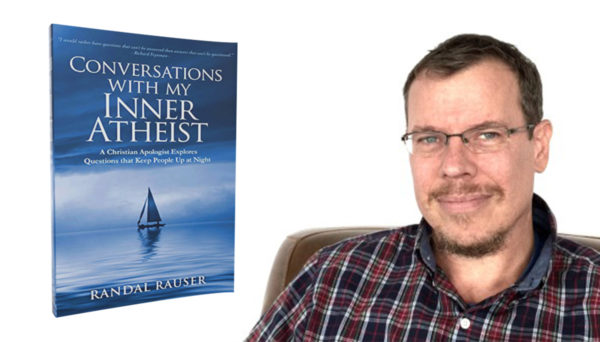How can the God of the Philosophers be the God of Abraham, Isaac, and Jacob?
by Dr. Randal Rauser
Filed under Uncategorized

Doubt and questioning are a part of the Christian faith. In Randal Rauser's new book, Conversations with My Inner Atheist, the Christian theologian and apologist explores his own doubts and questions by way of an internal conversation with his own inner atheist, Mia (i.e., "My Inner Atheist.") This article is a chapter drawn from the book in which Randal and Mia explore the question of how one can identify the God of the philosophers with the God described in the Bible.
Mia: I have a feeling you just danced around that last question but fine, whatever: here’s another problem. And this one goes to the heart of what Christians say about God.
Randal: Sounds good, I’m ready.
Mia: Okay, here goes. The God of the Bible is a being who has emotions (John 3:16; Psalm 5:5), he grows angry (Psalm 106:40), learns (Genesis 18:21), changes his mind (Jonah 3:10), has regrets (Genesis 6:6), has a body and face (Exodus 33:18-20), and sits on a throne (Psalm 103:19). That’s how the Bible describes God.
But then theologians and philosophers come along and say, oh, no, wait, God doesn’t actually have emotions, he doesn’t really grow angry. He doesn’t learn or change his mind; in fact, he has no regrets, no body, face or throne on which he sits. Instead, here’s what God really is: he is an impassible, eternal, non-physical, omnipresent, omniscient, and omnipotent being. Yeah, that’s it!
In other words, he’s completely different from the being actually described in the Bible.
Forgive me, but it looks like you’re trying to fit a square peg in a round hole. When you have two completely different descriptions the only conclusion is that these aren’t the same being at all.
How can the God of the Bible be the same being as this God of the Philosophers? You need to choose!
Randal: Yes, many people have sensed that tension. Your framing is well chosen, too: the great French philosopher Pascal famously attributed a mystical experience he had to “the God of Abraham, Isaac, and Jacob, not the God of the Philosophers.”
Mia: Great minds think alike.
I’ll level with you here: it seems to me that the reason theologians and philosophers gravitate to the God of the Philosophers is because they are embarrassed by the God of the Bible. They don’t know what to do with him. He isn’t sophisticated and respectable.
He appears capricious, mean, and unpredictable. He’s a finite being, located in spacetime and he has a body and learns and has regrets: in other words, he is little more than a glorified human being, no different in that respect than the gods of ancient Greece.
Randal: I understand that that may be your perception, but maybe I can help you with your incredulity. Imagine, for a moment the response of an average man when he first learns that according to the scientists, the heavy oak chair on which he is sitting is composed of vibrating packets of energy in empty space. Picture his incredulity. No doubt, he’d be thinking how can you possibly hope to unify these two utterly incompatible pictures of reality? A heavy oak chair that is somehow also vibrating packets of energy in empty space? It makes no sense. Obviously these are really just two different things, right?
But of course, it does make sense if one can understand that these are both legitimate descriptions and that they operate at different explanatory levels. The description of a heavy oak chair captures the everyday experience while the description of vibrating packets of energy provides the physicist’s description of that same reality.
By analogy, the God who acts in history, who learns, changes his mind, grows angry and the like may capture the perception of the everyday Christian. At the same time, the theologian describes God as having particular attributes such as eternality, impassibility, and omnipresence.
Mia: I have no problem with the basic idea of how a physicist arrives at her description of the oak chair. But how do you justify moving from the God of Abraham, Isaac, and Jacob to that abstraction debated by theologians and philosophers?
Randal: The first thing you need to recognize is that theology is not simply a product of reading the Bible and counting up the verses that support your view. Rather, it is a matter of reading the Bible in a complex process of reflective equilibrium.
Mia: Reflective what?
Randal: You reflect on Scripture in light of your rational and moral intuitions and reasoning, the reading traditions of your background community—like the priority of John 3:16 in understanding salvation— and personal and communal experience. All of these sources inform theological reasoning and together we can see how they bring a theologian stepwise from the experience of the person in the pew to the technical description of God employed by the professional theologian or philosopher.
Mia: That all sounds nice, but unless you can fill in the details, I’m going to suspect you are merely trying to justify the fact that you want to ignore all the Bible’s embarrassing details.
Randal: Pardon me, but can you fill in all the details from the quantum description of the chair to the experience of the man sitting in it?
Mia: Who’s askin’?
Randal: Yeah, I didn’t think so. So maybe you could cut me some slack.
Mia: I don’t claim to be a physicist. But, uh, you do claim to be a theologian.
Randal: Touché. Okay, perhaps I can say a bit more about one specific topic of theology: metaphysics.
Mia: ‘Metaphysics’ as in crystals and gurus and auras?
Randal: Goodness no, I mean metaphysics as in the area of philosophy that concerns our basic convictions about the structure and nature of the world. Just as everyone engages in philosophical reflection so everyone has a metaphysic, a set of beliefs about the nature of ultimate reality. A very basic part of philosophical reflection involves turning our drive for conceptual clarification toward our basic metaphysical commitments. As I said, the fact is that everyone has a philosophy and a metaphysic whether we recognize it or not, and it is important to become aware of what our philosophical views are and how they shape our thinking. As Fergus Kerr observes,
“If theologians proceed in the belief that they need neither examine nor acknowledge their inherited metaphysical commitments, they will simply remain prisoners of whatever philosophical school was in the ascendant 30 years earlier, when they were first year students.” (Theology After Wittgenstein (Oxford: Blackwell, 1986), 3.)
So it’s not like I’m reading the Bible through my philosophy and metaphysic while the guy who believes God literally experiences emotion and changes his mind is free of philosophy and metaphysics.
Rather, we’re both interpreting the text and engaging in theological and philosophical reflection as we go. As Alister McGrath puts it, philosophical theology is simply concerned with “the clarification of ideas.” (Christian Theology: An Introduction, 6th ed. (Wiley Blackwell, 2017), 91.) And we could all use more clarity in our thinking about God. So the question is not whether we shall think theologically and philosophically about these issues but rather whether we will do it well.
Mia: But I’m still not clear how you actually get to that philosopher’s abstraction based on the earthy and very human depiction of God in the Bible.
Randal: It might help to consider how we get to one big metaphysical claim in particular—the claim that God is perfect—because a lot flows from that one claim. The great medieval philosopher Anselm argued that when you reflect on the concept of God you arrive at a definition like this: God is that being than which none greater can be conceived.
Mia: Huh? What’s that even supposed to mean?
Randal: Put simply, it means that God is the greatest possible being, there is none greater. Now I have surveyed seminary students for almost twenty years by asking them “Do you think God is the most perfect being there could be?” Time and again, they agree.
In all that time, I’ve never had a single student say that God would be anything less than perfect. They might question our grasp of perfection, but they don’t question that God is perfect.
I think their intuitions in that regard are spot on. And that means that if we encounter passages in the Bible that depict God acting in ways that appear to be very far from perfect, we have one of two options: we can either revise our understanding of perfection or we can revise our reading of the passage in question.
So for example, the Bible depicts God changing his mind, having regrets, learning, growing angry, hating people, lashing out in rage, and so on.
Are these behaviors consistent with perfection? Christian theologians will disagree. But what I would hope we can appreciate is that when a theologian ends up with an understanding of God that looks rather different from some of the depictions in the Bible, she did not arrive at that picture by plucking it arbitrarily out of thin air. Rather, she reasoned to it carefully, informed by several factors including a basic intuitive conception of perfection read in critical dialogue with Scripture and informed by tradition, personal experience, and reason.
Thus, we can conclude that the one God that exists necessarily is the God of Abraham, Isaac, and Jacob. Just as the heavy oak chair is the same object as that particular collection of vibrating packets of energy so the God of Abraham, Isaac, and Jacob is the same perfect being as is described by the philosophers.
The next step in each case is to explore various models to justify these identity claims and reconcile any tension between them. And that’s what systematic theology is all about.
Admittedly, that was a very quick summary, but hopefully you can at least get a sense of how one can unite these two seemingly incompatible conceptions of God.
Pick up your copy of Conversations with My Inner Atheist: A Christian Apologist Explores Questions that Keep People Up at Night.
Related Posts
Note: Our goal is to cultivate serious and respectful dialogue. While it's OK to disagree—even encouraged!—any snarky, offensive, or off-topic comments will be deleted. Before commenting please read the Commenting Rules and Tips. If you're having trouble commenting, read the Commenting Instructions.













